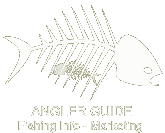 |  |
|
Navigation - Business - Great Lakes - Great Plains - Northeast - Northwest - Rocky Mountains - Southeast - Southwest - Technology - Trophy Catches
|
ODWC completed a four-day survey at Altus-Lugert April 25 with gill nets and by electrofishing. During this survey, no fish were caught. In ordinary surveys, ODWC would expect to capture about 1,000 fish in an effort of this size. It would appear that Altus-Lugert Lake is no longer a viable fishery. "While this is certainly disappointing, ODWC is going to do what we can to bring back the fishery. Right now we are evaluating our options, which include re-introducing forage fish such as shad and bluegill into the lake this spring and stocking sport fish to see if that is successful. It will be dependent on a decline in golden algae toxicity," said Larry Cofer, southwest region fisheries supervisor for ODWC. It is also likely that fish will return to the lake from upstream ponds and the river as toxicity from golden algae declines. The ODWC will continue to sample the lake for golden algae and fish to confirm and report the possible return of fish to the lake. While golden algae are naturally occurring, they have the potential to produce blooms that are toxic to gill-breathing organisms and turtles. Factors such as water quality, cooler water temperatures, nutrients in the water, salt concentrations, low rain levels and low amounts of healthy green algae create favorable conditions for a golden algae bloom. Drinking water is a concern in lakes when there is a fish kill. The Oklahoma Department of Environmental Quality (DEQ) has reviewed the operation of the City of Altus Public Water Supply and determined that this golden algae bloom should have no effect to the drinking water. Altus-Lugert Lake is one source of drinking water for the City of Altus, Oklahoma. At the current time, Altus is NOT using its intake structure located in this lake. DEQ is working closely with the City of Altus to ensure the safety of drinking water supplied to its residents. "DEQ encourages recreating on Oklahoma's many lakes, rivers and streams. We also want to remind people that to be safe in any body of water, people should never pick up dead or dying fish for consumption. It is also very important to be mindful of water conditions," said DEQ Executive Director Steve Thompson. DEQ reminds swimmers of the precautions to take to reduce exposure to waterborne micro-organisms: •Avoid swimming in polluted water (oil sheen, floating debris, and dead fish are visible signs of polluted water) •Avoid swimming in stagnant (unmoving) water •Avoid swimming in water with a temperature greater than 80°F (If water does not feel cool when you first enter, it is likely to be warmer than 80°F.) •Avoid swimming in water with a green surface scum •Avoid swimming after a heavy rain •Avoid swimming near storm drains •Avoid swallowing water while swimming •Hold nose or wear nose plugs when jumping into water •Wear ear plugs •Wear swim goggles •Wash cuts and scrapes with clean water and soap •Shower before and after swimming •Take children to the restroom frequently •Use swim diapers on infants.
Additional information can be found at http://www.deq.state.ok.us/factsheets/water/swimming.pdf. ODWC urges boaters and anglers on Altus-Lugert and other lakes to clean boats, live wells and fishing gear to help reduce the chance of golden algae spreading to other lakes. ODWC is working with DEQ and other state agencies as well as fish biologists from other states to develop methods to control golden algae blooms. Currently, research and monitoring is being done to better understand golden algae.
Comments
«Back | News Home
| |||||||||||||||||||||||||||||||||||